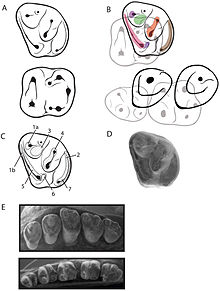Gomphos
Appearance
| Gomphos Temporal range: Early Eocene
| |
|---|---|

| |
| Drawings and SEM images of cheek teeth of Gomphos elkema | |
| Scientific classification | |
| Domain: | Eukaryota |
| Kingdom: | Animalia |
| Phylum: | Chordata |
| Class: | Mammalia |
| Grandorder: | Glires |
| Genus: | †Gomphos Shevyreva, 1975 |
| Species | |
Gomphos is an extinct genus of early lagomorphs from the early Eocene of the China and Mongolia.[1][2]
Gomphos was first named in 1975 from material found in the Gashato Formation.[1] There are currently two species in this genus: G. elkema, from the Greek word γόμφος (Romanized gomphos), which means "peg", but can also be used to signify molar teeth; and G. shevyrevae was named later in honour of the lead author who named the first original genus and species of Gomphos elkema.
Analysis supports Gomphos as one of the earliest lagomorphs, the group that includes rabbits, hares and pikas.[3] It is likely that lagomorphs split off from the rest of the placental mammals around the Cretaceous-Palaeogene boundary.[3]
Sources
[edit]- The Beginning of the Age of Mammals by Kenneth D. Rose
- The Rise of Placental Mammals: Origins and Relationships of the Major Extant Clades by Kenneth D. Rose and J. David Archibald
References
[edit]- ^ a b c Shevyreva, N. S., V. M. Chkhikvadze, and V. I. Zhegallo. "New data on the vertebrate fauna of the Gashato Formation, Mongolian People’s Republic." Bulletin of the Georgian Academy of Science 77 (1975): 225-228.
- ^ a b MENG, J., BOWEN, G. J., JIE, Y., KOCH, P. L., TING, S., QIAN, L., & JIN, X. (2004). Gomphos elkema (Glires, Mammalia) from the Erlian Basin: evidence for the early Tertiary Bumbanian land mammal age in Nei-Mongol, China. American Museum Novitates, 1-24.
- ^ a b Asher, Robert J., Jin Meng, John R. Wible, Malcolm C. McKenna, Guillermo W. Rougier, Demberlyn Dashzeveg, and Michael J. Novacek. "Stem Lagomorpha and the antiquity of Glires." Science 307, no. 5712 (2005): 1091-1094.
External links
[edit]- Gomphos in the Paleobiology Database
